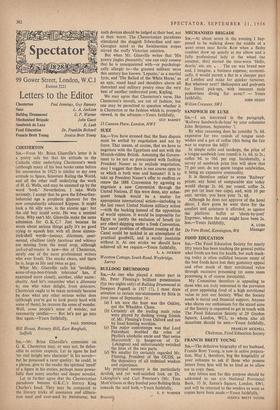Letters to the Editor
Chesterton Paul Jennings, Guy Ramsey Suez L. A. Jackson Bulldog Drummond E. P. Warner Mechanised Brigade John Guest Sandwich de Luxe R. Lush Food Education Dr. Franklin Bicknell Francis Brett Young Jessica Brett Young CHESTERTON
SLR,—From Mr. Brian Glanville's letter it is a pretty safe bet that his attitude to the Catholic ethic underlying Chesterton's work (although many of his best books came before his conversion in 1922) is similar to my own attitude to Space, Scientists Ruling the World, and all the other stuff underlying the work of H. G. Wells, and may be summed up by the word 'bosh.' Nevertheless, I take Wells seriously. I accept that he gave the Edwardian- industrial age a prophetic glamour for the new compulsorily educated Kippses. It might look a bit silly now, in the atomic age: but the old boy could write. He was a seminal force. Why can't Mr. Glanville make the same admission for G. K. C.? Just because he wrote about serious things gaily it's no good trying to squash him with all those sixteen- inch-shell words—fantasy, dilettante, senti- mental, ebullient (only facetious and whimsy are missing from the usual crop, although jack-of-all-trades is new—this of Chesterton, surely one of the most professional writers who ever lived). The smoke clears, and there he is, large as life and twice as gay.
What Mr. Glanville calls his 'invidious, some-of-my-best-friends tolerance' has, if examined more closely, another, older name: charity. And let's remember what a dilettante is; one who takes delight, from delectare. Chesterton ought to be taken seriously because he does what any other serious writer does (although you've got to look pretty hard with some of them); he restores the sense of wonder. Well, some people's sense of wonder, not necessarily intellec— But let's not go into that again.—Yours faithfully, PAUL JENNINGS Hill House, Rectory Hill, East Bergholt, Suffolk


































 Previous page
Previous page